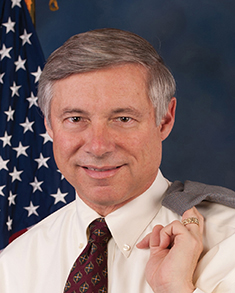U.S. Reps. Upton and DeGette
recognized for supporting
science in bipartisan fashion
United States Reps. Fred Upton, R-Mich., and Diana DeGette, D-Colo., have won the Howard K. Schachman Public Service Award from the American Society for Biochemistry and Molecular Biology for their championing of biomedical research and tireless efforts drafting and ensuring passage of the 21st Century Cures Act.


Howard K. Schachman served as chair of the ASBMB Public Affairs Advisory Committee for more than 10 years. To honor his legacy, the PAAC instituted the Schachman Award, which recognizes those dedicated to public service in support of biomedical science.
Chairman of the U.S. House Energy and Commerce committee, Upton partnered with DeGette to find a way to speed the discovery, development and delivery of therapies for diseases. Throughout most of 2014, Upton and DeGette were engaged in shepherding the 21st Century Cures initiative through that committee. They held numerous round tables and hearings on biomedical research and then drafted a bill that would increase funding for the National Institutes of Health and streamline the path for new drugs to reach patients.
The 21st Century Cures Act would establish an innovation fund to provide an additional $1.75 billion to the NIH budget each year for five years. The Accelerating Advancement Program, a grant-matching program to accelerate promising biomedical research projects, would receive $500 million from the innovation fund. The rest of the innovation fund would be divided among grants for early-stage investigators and research such as high-risk, high-reward projects and intramural research.
Upton and DeGette crossed the country and the aisle to meet with representatives and gain support for their bill. The 21st Century Cures Act was passed on the floor of the House in July by a resounding vote of 344 to 77.
Benjamin Corb, public affairs director of the ASBMB, said, “The ASBMB applauds Reps. Upton and DeGette for their bipartisan cooperation in drafting, managing and now passing the 21st Century Cures Act. And we appreciate the bipartisan support from the House of Representatives for biomedical research broadly — and the NIH specifically.”
Both Upton and DeGette have been invited to give remarks and receive their awards at a reception after the ASBMB spring Hill Day.
Enjoy reading ASBMB Today?
Become a member to receive the print edition four times a year and the digital edition monthly.
Learn moreGet the latest from ASBMB Today
Enter your email address, and we’ll send you a weekly email with recent articles, interviews and more.
Latest in People
People highlights or most popular articles

Building a career in nutrition across continents
Driven by past women in science, Kazi Sarjana Safain left Bangladesh and pursued a scientific career in the U.S.

Kiessling wins glycobiology award
She was honored by the Society for Glycobiology for her work on protein–glycan interactions.

2026 ASBMB election results
Meet the new Council members and Nominating Committee member.

Simcox wins SACNAS mentorship award
She was recognized for her sustained excellence in mentorship and was honored at SACNAS’ 2025 National Conference.

From humble beginnings to unlocking lysosomal secrets
Monther Abu–Remaileh will receive the ASBMB’s 2026 Walter A. Shaw Young Investigator Award in Lipid Research at the ASBMB Annual Meeting, March 7-10 in Washington, D.C.

Chemistry meets biology to thwart parasites
Margaret Phillips will receive the Alice and C. C. Wang Award in Molecular Parasitology at the ASBMB Annual Meeting, March 7-10 in Washington, D.C.

